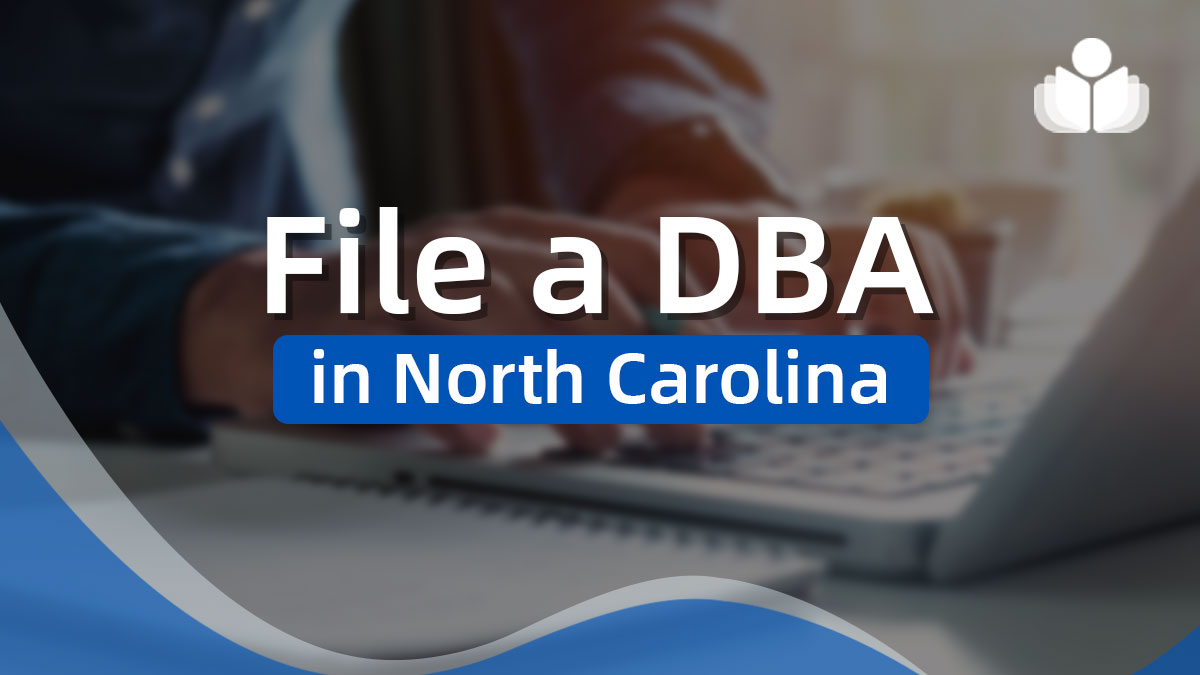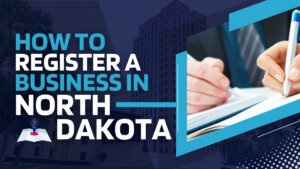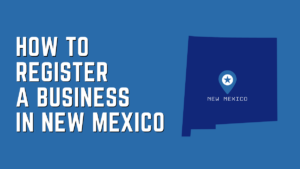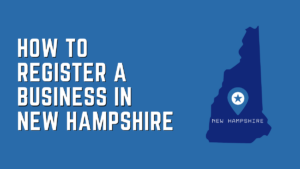If you want to learn about the implications of a DBA in North Carolina and how to register it, you’ve come to the right place. A DBA, short for “Doing Business As,” lets North Carolina entrepreneurs use an alternate business name for marketing, sales, and legal purposes. In other states, it might be called a fictitious name, assumed name, or trade name.
Unlike an LLC, a DBA isn’t a formal business entity and doesn’t offer the same advantages. Opting for an LLC in North Carolina often provides more benefits, including tax advantages and legal protections.
What Is a North Carolina DBA?
In North Carolina, a DBA (Doing Business As) allows individuals to conduct their business operations using a name other than their legal business name. Let’s say you own a company called “Four Brothers Roofing and Siding, LLC,” but expand your services to include window installation.
In this case, you can use a DBA and operate under the name “Four Brothers Exterior Construction.” The DBA allows you to showcase this new service on your website, social media platforms, physical advertisements, and even when opening a dedicated business bank account.
It’s crucial to understand that a DBA only represents an alternate name for your existing business. It doesn’t establish an entirely separate entity. Therefore, when it comes time to file taxes, you will still use your original legal business name and maintain the same Employer Identification Number (EIN) or Social Security Number (SSN), depending on whether you’re operating as a sole proprietorship or another type of entity.
Do I Need a DBA in North Carolina?
In North Carolina, it’s mandatory for various types of businesses, including sole proprietorships, general partnerships, Corporations, Limited Liability Companies (LLCs), Limited Partnerships (LPs), Limited Liability Partnerships (LLPs), and Out-Of-State Companies conducting business in the state under a name different from their legal name to submit a DBA filing with the North Carolina Secretary of State.
Compliance with this requirement ensures transparency and legal recognition for these entities operating within the state.
Will a DBA Protect My Privacy?
A DBA, or “Doing Business As,” is simply a name that a business can adopt for branding purposes. When applying for a DBA in North Carolina, disclose the name(s) of the business owner, manager, or member. Note that having a DBA doesn’t provide protection against public access to this information.
If privacy is a concern, one viable option is to engage the services of a North Carolina registered agent and establish an LLC (Limited Liability Company) in the state.
By partnering with Northwest, you can list our name and address on public records (where permitted), rather than your own. This approach serves two purposes: safeguarding your personal information from being publicly available and allowing you to maintain privacy as a business owner.
Why Register a North Carolina DBA?
Registering a North Carolina DBA, or assumed business name, offers many benefits. Let’s explore some of the most prevalent advantages:
You’re a North Carolina Sole Proprietor
Sole proprietors must incorporate their owner’s complete name in their business name if they don’t have a DBA. However, many sole proprietors opt to obtain a DBA to avoid conducting business under their personal name. This allows them to adopt a more professional or appealing business name and image that effectively reflects the nature of their products or services.
You Want a New Business Name
DBAs have applications beyond sole proprietors and can be used by formal businesses such as LLCs and corporations. This is useful when there’s a change in focus or expansion of services. For instance, let’s consider the scenario where “Davidson Dog Sitting, LLC” operates a dog-sitting business but plans to introduce dog training as an additional service.
In such cases, a DBA can provide the opportunity to adopt a new business name that better reflects the range of services offered by the LLC.
By registering “Davidson Dog Sitting and Training” as a DBA, it becomes possible to market the entire business without necessitating the creation of an entirely new LLC or making amendments to its legal name. This flexibility allows businesses like yours to adapt and evolve while maintaining their existing legal structure intact.
You Use Your Domain Name as Your Business Name
If your domain is solely being used as the address for your business website, there’s no requirement for a DBA. However, if you’re using your domain name as the official name of your business that customers interact with (for instance, if customers are writing checks addressed to your domain name), then registering a DBA becomes necessary.
Why Hire a Professional Service to File a DBA in North Carolina?
The process of filing a DBA in North Carolina involves several important steps, each crucial for ensuring a smooth and successful registration. It’s essential to avoid any mistakes during these procedures, as they can lead to the rejection of your application or even more severe consequences.
The state authorities in North Carolina can impose fines or potentially shut down your business if you improperly use a name in legal or business contexts.
Seek professional services to alleviate concerns and uncertainties related to the DBA process. These services have extensive knowledge of North Carolina’s specific requirements and can assist you in selecting an appropriate name before starting the paperwork.
These LLC companies offer various services, such as LLC filing, which can be advantageous for your business’s growth. By engaging with professionals, you can ensure that all necessary steps are taken correctly and increase your chances of a successful DBA registration.
Through extensive research, we have discovered the premier professional services specifically designed to cater to your DBA requirements in North Carolina.
Step 1: Find an Available Name
Once you have selected a name that suits your business, the initial step is to verify if someone else has registered it. Luckily, North Carolina maintains a publicly accessible database of assumed names that can be easily searched. Another database allows you to check if the name has been used as a DBA (Doing Business As) or registered with the state as a business entity name.
Although it’s permissible to register a name that’s similar to one already claimed, choose a unique name that won’t cause confusion with an existing business. Your chosen name should be memorable and appealing to customers.
The next crucial step involves checking whether the selected name is subject to state or federal trademark protection. While it’s possible to register a DBA that has already been trademarked, it’s recommended not to use trademarked terms when naming your business.
Using an already trademarked term for your business could expose you to potential lawsuits for infringement. In such cases, you may be required by law to cease using the infringing name and adopt another one instead. There’s also the possibility of facing financial damages if your use of the trademark negatively affects their business operations.
To ensure that your business can easily be found online, conduct a brief search on the internet. This will help you determine if you can secure a website domain name that either matches your DBA name or can be easily deduced from it. Having a concise and memorable website address is crucial for potential customers to locate your business online without any difficulty.
Step 2: Ensure the Name Meets State Requirements
In North Carolina, adhere to specific rules regarding DBA names, even if another business in the North Carolina isn’t using the same name. Firstly, your DBA name cannot include a business entity suffix unless you have registered with the state as that specific type of business entity.
For instance, using “LLC” or “Corp.” in your DBA name isn’t allowed unless you have officially registered as an LLC or corporation.
There are certain terms that require approval from the Secretary of State before they can be used in a DBA. With this approval, their usage is allowed by the state regulations.
- Architect, Architecture, or Architectural
- Bank or Banker
- Certified Public Accountant (CPA)
- Co-op
- Trust
- Engineer or Engineering
- Insurance
- Pharmacy, Drug, Rx, Prescription, or Apothecary
- Realtor
- Surveyor or Survey, or Surveying
- Wholesale
The next consideration is that any small elements such as articles, conjunctions, prepositions, punctuation marks, spaces, and the replacement of a word with a numeral will not be considered.
If a company named “Linens ‘N Things” has already registered to operate in North Carolina, it’s probable that requests for “Linens & Things” or “Linens and Things” as Doing Business As (DBA) names will be denied by the state.
You can find further details about North Carolina’s regulations regarding business naming on the Secretary of State’s official website.
Step 3: Register Your DBA With Your County
After identifying a suitable DBA name for your business, one that’s easily recalled, the next step is to register it with the local county register of deeds. In registration forms, counties typically refer to DBAs as “assumed business names,” although these terms are often used interchangeably.
The North Carolina Association of Registers of Deeds website offers a comprehensive list of county registers. Your county should provide the necessary forms for registering and obtaining the relevant certificates.
- Certificate for an assumed business name, facilitating the registration of a DBA for a sole proprietorship, general partnership, LLC, corporation, limited partnership, or Limited Liability Partnership.
- Amendment to an assumed business name certificate, allowing modifications to the information initially provided in the certificate.
- Withdrawal of an assumed business name certificate, utilized to retract a previously filed assumed business name certificate.
To obtain any of the DBA certificates, there’s a fee of $26, the DBA must be renewed every five years.
When applying for a DBA, applicants must provide certain information to the county. This includes the requested DBA name, as well as the legal name of the individual or entity applying for it. Applicants need to provide their business’s mailing address and specify the nature of their business. They should indicate whether they plan on operating in all 100 counties of North Carolina.
In cases where the registrant is an LLC, corporation, or limited partnership, it becomes necessary to furnish both the exact registered name with the North Carolina Secretary of State’s Office and its SOSID number.
While some services are available to register a DBA on behalf of individuals for a fee, it’s possible to complete and submit a one-page form independently. It should be noted that unlike some other states which require publication in local newspapers announcing registration of a DBA, North Carolina doesn’t impose this requirement.
How Much Does a DBA Filing Cost in North Carolina?
The cost of filing a DBA in North Carolina is $26. Unfortunately, expedited services aren’t available in the state.
Although the Secretary of State oversees DBAs, contacting your local County Register of Deeds for specific instructions related to your county is advisable. In North Carolina, a DBA doesn’t have an expiration date and, therefore, doesn’t need to be renewed.
You must have your Assumed Business Name Certificate notarized before submitting it in North Carolina. The cost associated with this step will depend on the fees charged by the notary public.
Best DBA Filing Services to Register Fictitious Name in North Carolina – NC DBA
Discover exceptional services for the registration of a fictitious name in North Carolina.

Bizee simplifies the process of filing a DBA in North Carolina, also called an assumed business name. Just enter your company’s information, receive a quote, and generate your new fictitious name. Bizee handles all paperwork and hurdles during registration.
Aside from aiding with DBA applications in North Carolina, Bizee provides various services. These encompass LLC and Corporation establishment, acquiring Employer Identification Numbers, and appointing a registered agent. More than 800,000 business proprietors have utilized these offerings.

BusinessRocket is an invaluable resource for individuals seeking to file a Doing Business As (DBA) in North Carolina. Designed specifically for entrepreneurs and business owners, it offers a seamless and user-friendly experience.
By simplifying the often complex paperwork associated with DBA registration in North Carolina, BusinessRocket provides intuitive online tools and step-by-step guidance.
The main goal of BusinessRocket is to streamline the entire process by guiding individuals through the legal requirements and ensuring that their chosen business name is unique while also adhering to North Carolina regulations.
With helpful features like document preparation and filing assistance, BusinessRocket facilitates a smooth DBA registration process, enabling individuals to quickly establish their presence in North Carolina.

Northwest Registered Agent is a reliable option for various legal services, including filing DBAs in North Carolina. As a registered agent, Northwest provides businesses with a physical address that meets the state’s requirements for operating under an assumed name.
Besides DBA filings, Northwest Registered Agent offers various compliance services, such as submitting annual reports and forwarding mail. This comprehensive approach ensures that businesses remain in good standing with the state, freeing up business owners from administrative tasks and enabling them to concentrate on growing their ventures.
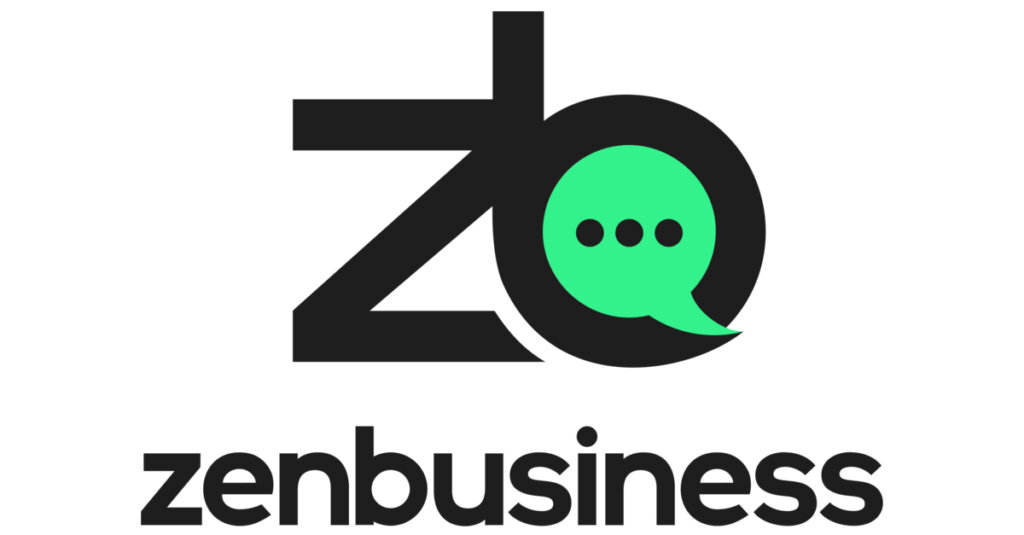
ZenBusiness offers a convenient, integrated free DBA name search specifically designed for individuals in North Carolina who are looking to find the perfect business name. By inputting keywords, ZenBusiness provides a list of suggestions that can be used as inspiration or selected outright.
Once you’ve chosen your ideal name, it’s as simple as providing ZenBusiness with the necessary information for filing, which takes just ten minutes.
What sets ZenBusiness apart is its commitment to transparency regarding startup costs and ongoing support beyond the DBA application process. In addition to helping businesses maintain compliance with regulations, ZenBusiness also offers valuable assistance in organizing financial information during tax time each year.
With their comprehensive suite of tools and services, they strive to be a trusted partner in guiding businesses through every step of their journey.
DBA vs. LLC in North Carolina
In the state of North Carolina, businesses can operate under a name different from their legal business name by obtaining a “Doing Business As” (DBA) designation. By forming a Limited Liability Company (LLC), business owners establish a separate legal entity that provides protection for their personal assets in case of any legal action or debt default by the LLC.
Note that obtaining a DBA for your LLC doesn’t change the nature of the LLC itself or transform it into a separate business entity. For sole proprietors, having a DBA doesn’t affect their status as sole proprietors either. It’s crucial to understand that simply having a DBA doesn’t grant any legal rights or protections to business owners.
Deciding between an LLC and a DBA depends on the specific needs and preferences of each individual business owner. Sole proprietors who wish to operate under another name besides their own may find that getting just a DBA is sufficient. However, those who prioritize safeguarding their personal assets should consider forming an LLC as it’s recommended.
File a DBA in North Carolina – Frequently Asked Questions
If you’re still unsure about the process of filing a DBA in North Carolina, keep reading to discover the information you need.
Conclusion – File a DBA in North Carolina
Follow our three-step guide to easily master completing a DBA application in North Carolina. Utilize Bizee, a dependable platform, to streamline your DBA filing. Partner with Bizee to establish and enhance your business identity, saving time and ensuring accuracy in every registration step.
 Sections of this topic
Sections of this topic
